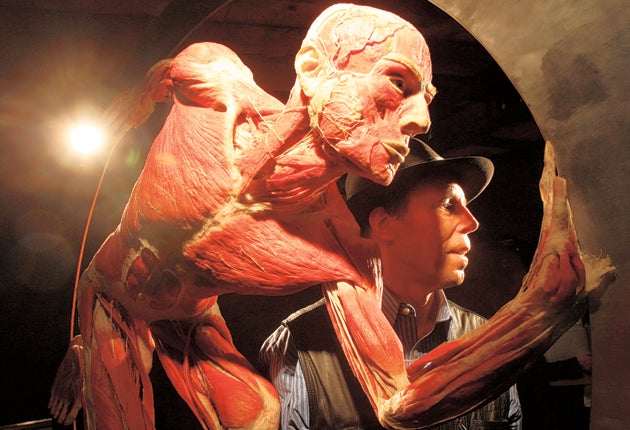'Dr Death' to sell body parts over the internet

Your support helps us to tell the story
From reproductive rights to climate change to Big Tech, The Independent is on the ground when the story is developing. Whether it's investigating the financials of Elon Musk's pro-Trump PAC or producing our latest documentary, 'The A Word', which shines a light on the American women fighting for reproductive rights, we know how important it is to parse out the facts from the messaging.
At such a critical moment in US history, we need reporters on the ground. Your donation allows us to keep sending journalists to speak to both sides of the story.
The Independent is trusted by Americans across the entire political spectrum. And unlike many other quality news outlets, we choose not to lock Americans out of our reporting and analysis with paywalls. We believe quality journalism should be available to everyone, paid for by those who can afford it.
Your support makes all the difference.Gunther von Hagens, the originator of the controversial Body Worlds anatomical exhibitions, has provoked a fresh storm of criticism in Germany after announcing plans for an online store selling plastinated human body parts.
Mr von Hagens, who enjoys the nickname "Doctor Death" because of his highly publicised shows, which display fleshless human corpses that have been injected with plastic resin, revealed his plans for internet expansion in a letter to his clients.
According to the Sueddeutsche Zeitung newspaper, the letter said an online plastinated body parts shop would go online from 3 November, selling whole human bodies for €69,615 (£61,733) apiece.
Mr von Hagens has insisted however that his products will not be available to the general public, and will be sold only to scientists and medical experts. In addition to whole bodies, the shop will offer torsos at €56,644 each and human heads at €22,015. Plastinated animal parts will also be available.
His plans have provoked angry criticism from Germany's Roman Catholic Church, and further condemnation of the project is almost certain to follow. Archbishop Robert Zollitsch appealed to politicians to ban the online store, insisting that Mr von Hagens was "breaking a taboo".
Dismissing Mr von Hagen's repeated claims that his plastinated bodies are of scientific value, the archbishop said the idea showed lack of respect for the dead. "This is not about new discoveries but about picking at bones and creating a spectacle under the guise of medical enlightenment," he said.
Mr von Hagens, who likes to dress in black and is almost always seen in public wearing a wide-brimmed black hat, has been a source of controversy since he developed his plastination technique more than a decade ago.
The process involves removing body fluids and fat from human corpses and replacing them with plastic resin.
In 2002, Mr von Hagens went ahead with the first public autopsy held in Britain for 170 years despite concerns that he would be arrested. In 2004 he was accused of using the bodies of executed prisoners sold to him by China. He subsequently returned seven corpses which had injuries to the head because he could not prove that they had not been executed.
After opening a series of provocative Body Worlds exhibitions showing human bodies in various poses, Mr von Hagens went a stage further in May last year when he displayed two plastinated bodies having sex, in an exhibition entitled "Cycle of Life".
The show prompted a cross-party group of German MPs to demand that the exhibition be withdrawn. However virtually all attempts to stop his exhibitions have failed.
Mr von Hagens recently reopened his "Plastinarium", a factory in the east German state of Brandenburg which turns out plastinated corpses and employs 200 workers. Attempts to stop the plant going ahead were overruled because it provided jobs in a region suffering from high unemployment. Mr von Hagens has long since become a millionaire.
Join our commenting forum
Join thought-provoking conversations, follow other Independent readers and see their replies
Comments